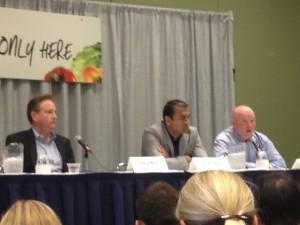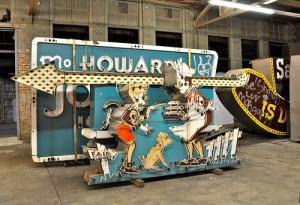
God, what a poorly shot photograph of the Franchise Operators President’s Panel at the 2013 National Restaurant Association Show. But it’s the best I got. Panelists, left to right: Chris Rich (TGI Friday’s, Caribou Coffee, Italianni’s), Al Bhakta (Genghis Grill), John Maguire (Panera, Friendly’s).
My favorite moment from the 2013 National Restaurant Association show in Chicago last week came during a panel entitled, “Franchise Operators Presidents’ Panel.” It was when John Maguire, CEO of maybe-kind-of-still-languishing Friendly’s, described a dark night of his business soul soon after taking the job when he asked himself, “Should Friendly’s Exist?” and didn’t instantly reply to himself, “Of course.”
(That’s my précis.)
Heavy stuff.
There is a tendency to assume mere continuity is positive: if something existed yesterday, then it should exist tomorrow. As part of my neighborhood preservation alliance, I know that some people unthinkingly assume that we should maintain everything that ever existed.
But what if a restaurant’s time has come and gone? What if it’s no longer useful?
If you think of your restaurant as a solution for people with a problem—people in search of relaxation, people needing affordable and quick refreshment, people seeking a pleasant space in which they can be social, people who are tired of the same old—then it forces you to ask: what problem does your restaurant solve well?
Is it even a problem people really have?
Are there other people solving it better than you?

Howard Johnson neon signs are part of The American Sign Museum of Cincinnati. Because there’s really no need for them anyplace else.
Was the restaurant brought into existence by solving a problem that’s changed, or gone away?
That’s kind of what happened to Friendly’s: people have a lot more choices for “places to indulge and celebrate” and as the restaurant let their operations, um, slide somewhat, people failed to see Friendly’s as a necessary business. Nobody needed a place like Friendly’s had become.
Maguire is working on that.
Meanwhile, it’s interesting to ask: should your restaurant exist? Does it solve a problem that people actually have, and solve it better than other places? Are you Howard Johnson’s-esque?
Let’s think about this. Should these restaurants exist?
- McDonald’s Sure, yes. They’ve burrowed into our culture so deeply, they’re the go-to choice in most small towns when you’re in a hurry or not dressed up much, or with a kid. In larger markets, they’ve kept their products relevant and innovative, and their prices affordable.
- Hardee’s/Carl’s Jr. I don’t know. They have momentum, for sure, and they’ve made a pretty broad appeal to young men. But if they went away, wouldn’t their customers just migrate to the QSR across the street?
- Subway Sure. An alternative to QSR (we all know we’re supposed to limit our QSR occasions for health reasons, but it’s so darn convenient and somewhat addictive). Almost as fast and about the same price. Yeah. We need that.
- Quiznos Maybe not. Maybe there are enough hot, grilled sub-type places—and Quizno’s has managed their brand into a confused, indistinguishable mess: they accidentally took themselves from appearing truly different, innovative, risk-taking and fun to appearing me-too, uninteresting, typical and commoditized. Just look at the cameo from Jim Parsons—Sheldon from Big Bang Theory—in that old ad, and compare it to that newer ad: I’m not wrong about the branding represented by those two ads. Maybe there were problems with the original positioning, or there was no comfort level with the bolder corporate image among the franchisees, or some other problem. But when I watch these ads, the difference is stark: one business I “get” and identify with, for better or worse. The other is telling me nothing new and nothing believable and nothing that commands attention or affection—I shrug. Maybe we don’t need a brand like that.
This exercise is worth continuing. I’ll stop here, but it might be interesting to go into a dark, quiet room and ask the question of the restaurant you help market: “Should we exist?”
And then not fudge the answer.
Like John Maguire did.
Is doing.
Then you can start changing what needs to be changed to make sure you’re solving people’s problems again.
